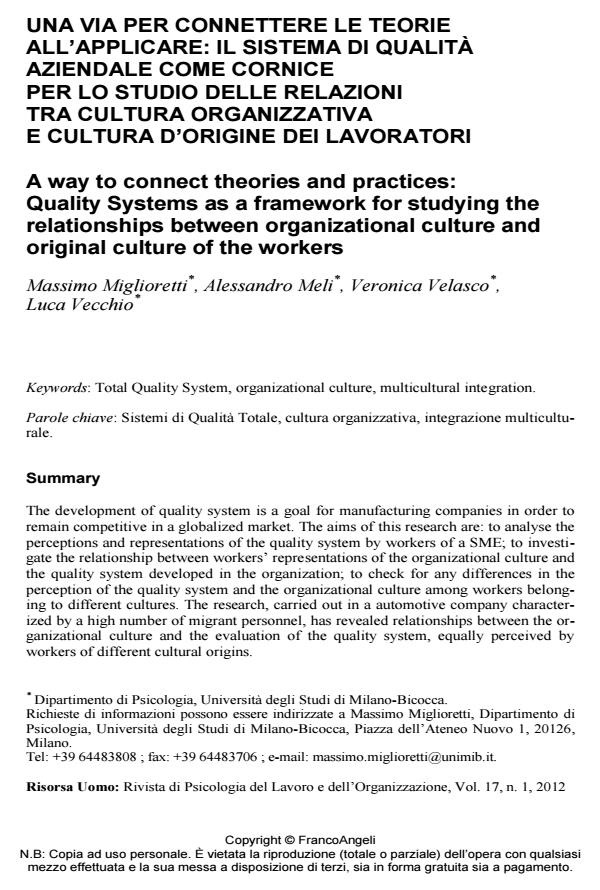A way to connect theories and practices: Quality Systems as a framework for studying the relationships between organizational culture and original culture of the workers
Journal title RISORSA UOMO
Author/s Massimo Miglioretti, Alessandro Meli, Veronica Velasco, Luca Vecchio
Publishing Year 2014 Issue 2012/1 Language Italian
Pages 17 P. 119-135 File size 911 KB
DOI 10.3280/RU2012-001011
DOI is like a bar code for intellectual property: to have more infomation
click here
Below, you can see the article first page
If you want to buy this article in PDF format, you can do it, following the instructions to buy download credits

FrancoAngeli is member of Publishers International Linking Association, Inc (PILA), a not-for-profit association which run the CrossRef service enabling links to and from online scholarly content.
The development of quality system is a goal for manufacturing companies in order to remain competitive in a globalized market. The aims of this research are: to analyse the perceptions and representations of the quality system by workers of a SME; to investigate the relationship between workers’ representations of the organizational culture and the quality system developed in the organization; to check for any differences in the perception of the quality system and the organizational culture among workers belonging to different cultures. The research, carried out in a automotive company characterized by a high number of migrant personnel, has revealed relationships between the organizational culture and the evaluation of the quality system, equally perceived by workers of different cultural origins
Lo sviluppo di Sistemi di Qualità è un obiettivo per diverse aziende manifatturiere, al fine di mantenersi competitive in un mercato globalizzato. Questo lavoro si propone di: analizzare le percezioni e le rappresentazioni del sistema di qualità aziendale da parte dei lavoratori di una PMI; studiare i legami tra le loro rappresentazioni della cultura aziendale e del sistema di qualità; verificare le eventuali differenze nella percezione del sistema di qualità e della cultura organizzativa in lavoratori provenienti da diverse culture. La ricerca, effettuata in un’azienda operante nel settore automotive connotata da un alto numero di personale migrante, ha evidenziato relazioni tra cultura aziendale e cultura della qualità, percepite in modo uniforme dai lavoratori di diversa cultura d’origine.
Keywords: Total Quality System, organizational culture, multicultural integration.
- American Quality Foundation, Ernst, & Young (1992). The international quality study best practices report: An analysis of management practices that impact perfor mance. Montvale, NJ: National Association of Accounting.
- Baird, K., Jia Hu, K., & Reeve, R. (2011). The relationships between organizational culture, total quality management practices and operational performance. Interna tional Journal of Operations & Production Management, 31(7), 789-814. DOI: 10.1108/0144357111114485
- Benson, P. G., Saraph, J. V., & Schroeder, R. G. (1991). The effects of organizational context on quality management: An empirical investigation. Management Sci ence, 37(9), 1107-1124. DOI: 10.1287/mnsc.37.9.110
- Biazzo, S., & Bernardi, G. (2003). Process management practices and quality systems standards. Risks and opportunities of the new ISO 9001 certification. Business Pro cess Management Journal, 9, 149-169. DOI: 10.1108/14637150310468371
- Boselie, P., & Van der Wiele, T. (2002). Employee perceptions of HRM and TQM, and the effects on satisfaction and intention to leave. Managing Service Quality, 12, 165-172. DOI: 10.1108/0960452021042923
- Cameron, K. S., & Quinn, R. E. (1999). Diagnosing and changing organizational cul ture. Reading, MA: Addison-Wesley.
- Cervai, S., & Gabassi, P. G. (2001). Uno strumento di rilevazione degli aspetti psicolo gici della qualità totale. Risorsa Uomo, 8(1-2), 15-17. DOI: 10.1400/7966
- Das, A., Pagell, M., Behm, M., & Veltri, A. (2007). Toward a theory of the linkages between safety and quality. Journal of Operations Management, 26, 521-535. DOI: 10.1016/2007.06.00
- Eisemberger, R., Armeli, S., Rexwinkel, B., Lynch, P. D., & Rhoades, L. (2001). Recip rocation of perceived organizational support. Journal of Applied Psychology, 86, 42-51. DOI: 10.1037/0021-9010.86.1.4
- Kreitner, R, & Kinicki, A. (2004). Organizational behavior. Burr Ridge, ILL: McGraw-Hill/Irvin.
- Powell, T.C. (1995). Total quality management as competitive advantage: A review and empirical study. Strategic Management Journal, 16, 15-37. DOI: 10.1002/smj.425016010
- Soltani, E., van der Meer, R., & Williams, T. (2005), A contrast of HRM and TQM ap proaches to performance management: Some evidence. British Journal of Manage ment, 16, 211-230. DOI: 10.1111/j.1467-8551.2005.00452.
- Taylor, W.A., & Wright, G.H. (2003). A longitudinal study of TQM implementation: Factors influencing success and failure. The international Journal of Management Science, 31, 97-111. DOI: 10.1016/S0305-048
- Yong, J., & Wilkinson, A. (1999). The state of Total Quality Management: A review. The International Journal of Human Resource Management, 10, 137-161. DOI: 10.1080/09585199934068
- Yusof, S. M., & Aspinwall, E. (2000). TQM implementations issues: Review and case study. International Journal of Operations & Production Management, 20(6), 634-655. DOI: 10.1108/0144357001032159
Massimo Miglioretti, Alessandro Meli, Veronica Velasco, Luca Vecchio, Una via per connettere le teorie all’applicare: il sistema di qualità aziendale come cornice per lo studio delle relazioni tra cultura organizzativa e cultura d’origine dei lavoratori in "RISORSA UOMO " 1/2012, pp 119-135, DOI: 10.3280/RU2012-001011